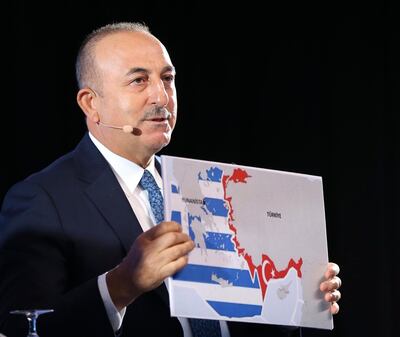The foreign ministers of Turkey and Greece met on Thursday for the first time since the two Nato members came close to a full-blown conflict over access to resource-rich waters in the eastern Mediterranean.
Turkish Foreign Minister Mevlut Cavusoglu and his Greek counterpart Nikos Dendias met on the sidelines of the Global Security Forum in the Slovak capital Bratislava to discuss "bilateral and regional issues," Turkish media reported.
The meeting between the Greek foreign minister and his Turkish counterpart marks another step towards negotiations amid heightened tensions between Athens and Ankara.
Greek and Turkish officials said the ministers agreed to set a date for the start of a new round of exploratory talks between the two countries.
In recent months, a dispute between Greece and Cyprus on one side and Turkey on the other over maritime borders and exploration rights in resource-rich waters in the eastern Mediterranean has boiled over.

Greece and Turkey, two Nato allies, have come close to direct confrontation after the latter sent research vessel Oruc Reis into Greek waters with half a dozen warships. Greece responded by mobilising the bulk of its fleet.
While the Oruc Reis has now withdrawn, easing tensions, the dispute over the waters continues.
Speaking at the Global Security Forum earlier in the day, Mr Cavusoglu lashed out at Greece’s claims in the Eastern Mediterranean, characterising them as “maximalist.”
He also repeated accusations that Greek warships, deployed when the Oruc Reis entered Greek waters, had acted aggressively towards the Turkish vessels.
The disagreement between Greece and Turkey has caused a significant rift in the Nato alliance. The alliance has hosted technical discussions between the two nations in recent weeks. The Turkish foreign minister confirmed these talks had continued.
The European Union has also found itself divided over the disagreements between its two member states, Greece and Cyprus, and Turkey.
Earlier in October, following a special summit of EU leaders on sanctions against Turkey, the EU warned it could still impose sanctions on Ankara if Turkish "provocations and pressures" continue in the East Mediterranean.
"We want a positive and constructive relationship with Turkey,” said European Commission President Ursula von der Leyen. "But it will only work if the provocations and pressures stop. We therefore expect that Turkey from now on abstains from unilateral actions.”
Greece on Thursday called on Turkey to step back from reopening an abandoned beach resort in Cyprus, warning that Athens and Nicosia stand ready to bring the issue before European leaders.
Northern Cyprus, which is only recognised by Turkey, reopened the beach of a resort abandoned since the 1974 conflict on the island, Turkish media reported, taking a step supported by Ankara but condemned by the Republic of Cyprus in the south.
The frozen conflict in Cyprus has also been brought to bear on tensions in the eastern Mediterranean, as Turkey has carried out research in Cyprus’ exclusive economic zone.
Mr Cavusoglu said in Bratislava that only Greek Cypriots and their European allies view Turkish actions in Cypriot waters as illegal and called for “fair equitable revenue sharing” of resources for Turkish Cypriots.
In a question at the Global Security Forum, the Cypriot Ambassador to Slovakia, Nicos Nicolaou, highlighted the continued presence of 40,000 Turkish troops in Cyprus since 1974 and asked if Ankara would end its occupation of the northern part of the island.












